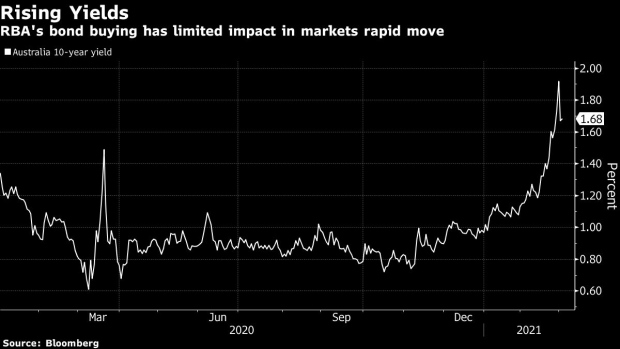Mar 2, 2021
Australia Central Bank Stands Pat After Shock-And Awe Moves
, Bloomberg News

(Bloomberg) -- Australia’s central bank kept its key policy settings unchanged, while reinforcing a commitment to its three-year target following a campaign of shock-and-awe in bond markets.
Governor Philip Lowe and his board held the cash rate and three-year yield target at 0.10%, the Reserve Bank of Australia said in a statement Tuesday. The central bank increased bond purchases over the past week as it sought to soothe markets in the face of a global bond rout.
“The bank remains committed to the 3-year yield target and recently purchased bonds to support the target and will continue to do so as necessary,” Lowe said. “Also, bond purchases under the bond purchase program were brought forward this week to assist with the smooth functioning of the market.”
After the upheaval in yields over the past week, market reaction was muted Tuesday. The 10-year yield spiked seven basis points higher while the three-year yield to further from target to 0.13%, suggesting markets will continue to test the RBA with reflation bets.
The Australian dollar trimmed its intraday decline to be down 0.1% at 77.66 U.S. cents at 3:05 p.m. in Sydney.
Central banks and bonds markets are locked in a showdown as efforts to keep borrowing costs low are being tested by inflation bets amid a rapid global economic recovery. Policy makers have pushed back on the rising tide of yields, emphasizing that any short-term spike in inflation will prove temporary.
Yield Defense
Australia has found itself on the front line of this struggle as a commodity powerhouse with a strengthening economy. The RBA bought A$7 billion ($5.4 billion) of government securities in defense of its three-year target last week, including an unscheduled operation on Friday. It followed up Monday by doubling its usual purchases of longer-dated debt, spurring the biggest drop in yields in a year.
“The bank is prepared to make further adjustments to its purchases in response to market conditions,” Lowe said today. “The current monetary policy settings are continuing to help the economy by keeping financing costs very low, contributing to a lower exchange rate than otherwise, and supporting the supply of credit and household and business balance sheets.”
Fed Chair Jerome Powell last week spent two days telling U.S. lawmakers the economy is in no state to be thinking about monetary tightening, yet shortly after financial markets started pricing in a rapid recovery. European Central Bank President Christine Lagarde is “closely monitoring” government debt yields. The Reserve Bank of New Zealand said earlier today that it stood ready to ramp up bond purchases.
Covid Suppression
Australia’s suppression of Covid-19, combined with substantial fiscal and monetary injections is driving a V-shaped recovery. Sentiment is strong, underpinning activity and hiring; on top of that, the nation’s largest export -- iron ore -- is hovering around $170 a ton, levels last seen a decade ago.
Economists estimate the economy expanded 2.5% in the final three months of last year from the prior quarter, ahead of data Wednesday. Yet, gross domestic product probably contracted 1.9% from a year earlier, they said.
The low cost of borrowing is fueling a rapid rebound in property with the housing market recording its largest monthly gain in 17 years and lending reaching a record high in January.
“Housing credit growth to owner-occupiers has picked up, but investor and business credit growth remain weak,” Lowe said. “Lending standards remain sound and it is important that they remain so in an environment of rising housing prices and low interest rates.”
(Updates with market reaction in fourth paragraph.)
©2021 Bloomberg L.P.


